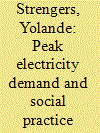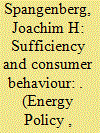|
|
|
Sort Order |
|
|
|
Items / Page
|
|
|
|
|
|
|
| Srl | Item |
| 1 |
ID:
186462


|
|
|
|
|
| Summary/Abstract |
One of the main strategies employed to increase the energy efficiency of buildings is the insulation and sealing of building envelopes. This has led to considerable reductions in energy consumption in recent decades. However, with the increasing efficiency of the building envelope, a contrary effect is also evident: energy performance gaps (EPGs), the phenomenon where actual consumption exceeds calculated demand. While EPGs have often been associated with rebound effects, socio-technical studies argue that it is the interactions between occupants and buildings (or building technologies), which have negative, often unintended, consequences for energy consumption. To analyse these interactions and their contribution to EPGs, we conducted a survey of 34 households in two moderately insulated multi-apartment buildings and calculated EPGs at the apartment level. Based on the results, we argue that increasing the building insulation can lead to negative interaction effects because occupants adapt to the changes in building behaviour, producing a shift in energy consumption for the whole building. Building inertia and reduced feedback are likely accompanied by higher indoor temperatures and increased ventilation. We suggest that a better understanding of these mechanisms is necessary to evaluate the real savings of different efficiency measures, and discuss various implications for policy and research.
|
|
|
|
|
|
|
|
|
|
|
|
|
|
|
|
| 2 |
ID:
166510


|
|
|
|
|
| Summary/Abstract |
In West Africa, household energy transition has so far mainly been synonymous with the conversion from woodfuel to LPG. This paper analyses the failure of 30 years of household energy transition policies in Mali by combining two major frameworks: Multi-Level Perspective (MLP) and Social Practice Theory (SPT). Based on empirical field studies undertaken in Bamako since 1985 and on literature review, two historical narratives are presented, one focusing on the dynamics of the dominant woodfuel regime and the other on changes in cooking practices. The MLP analysis showed that all elements seemed aligned for destabilization of the dominant regime, yet the woodfuel regime has resisted and is maintained. The SPT analysis showed that the stability of cooking, eating and fuel purchasing practices did not converge towards and even opposed the transition to LPG. This paper shows that the MLP and SPT frameworks offer complementary perspectives for understanding transitions in developing countries. It concludes that the definition and implementation of energy policies need to integrate an analysis of daily practices and should consider that energy transition is not synonymous with the replacement of one fuel by another, but with new opportunities to diversify ways of cooking.
|
|
|
|
|
|
|
|
|
|
|
|
|
|
|
|
| 3 |
ID:
112305


|
|
|
|
|
| Publication |
2012.
|
| Summary/Abstract |
Demand managers currently draw on a limited range of psychology and economic theories in order to shift and shed peak electricity demand. These theories place individual consumers and their attitudes, behaviours and choices at the centre of the problem. This paper reframes the issue of peak electricity demand using theories of social practices, contending that the 'problem' is one of transforming, technologically-mediated social practices. It reflects on how this body of theory repositions and refocuses the roles and practices of professions charged with the responsibility and agency for affecting and managing energy demand. The paper identifies three areas where demand managers could refocus their attention: (i) enabling co-management relationships with consumers; (ii) working beyond their siloed roles with a broader range of human and non-human actors; and (iii) promoting new practice 'needs' and expectations. It concludes by critically reflecting on the limited agency attributed to 'change agents' such as demand managers in dominant understandings of change. Instead, the paper proposes the need to identify and establish a new group of change agents who are actively but often unwittingly involved in reconfiguring the elements of problematic peaky practices.
|
|
|
|
|
|
|
|
|
|
|
|
|
|
|
|
| 4 |
ID:
166578


|
|
|
|
|
| Summary/Abstract |
It is increasingly obvious that for safeguarding environmental sustainability, eco-efficiency measures will need to be complemented by sufficiency, in particular by strong sustainable consumption. The Theory of Planned Behaviour TPB and Social Practice Theory SPT offer different views on consumer behaviour, and on ways to change it. This paper briefly describes the challenges, discusses the applicability of both theories and their meaningfulness for policy recommendations.
|
|
|
|
|
|
|
|
|
|
|
|
|
|
|
|
| 5 |
ID:
150812


|
|
|
|
|
| Summary/Abstract |
Social scientists are arguing that energy policies should pay more attention to everyday life to address energy efficiency. Scholars are now positing that energy policy needs to move beyond essentialised understandings of people positioned as the problem and seek to involve household members as part of the solution. Joining this conversation, we explore the energy narratives of low-income people aged 60 years and over, living in private sector housing. Participants shared their energy efficiency stories during focus groups conducted in the Illawarra, Australia. The paper explores how Foucault's concept of governmentality may help inform energy efficiency programs by paying close attention to the way in which individual energy choices made under certain circumstances create who an individual becomes. Learning from participants, our governmentality analysis revealed the tyrannies of thrifty domestic energy conduct. We illustrate our argument drawing on the examples of practices relating to clothing and lighting. We outline how governmentality analysis can be used by researchers, policy makers and practitioners to assist people to safely negotiate energy efficiency in their domestic lives.
|
|
|
|
|
|
|
|
|
|
|
|
|
|
|
|
|
|
|
|
|